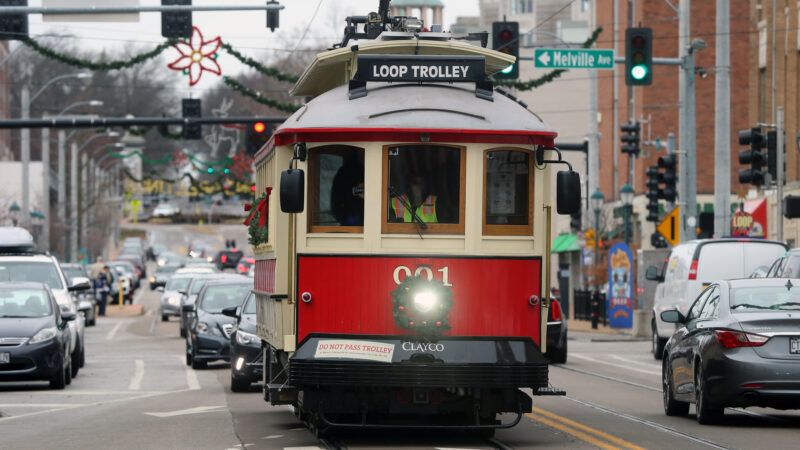St. Louis Taxpayers Paid a Lot To Run a Money-Losing Streetcar. It Could Cost Them Even More To Shut It Down.
The Federal Transit Administration says St. Louis officials either need to get its Loop Trolley back up and running or return $37 million in federal funds.

In a paradox only the federal government could produce, St. Louis officials are having to decide whether they want to spend money reviving the city's long-troubled, currently mothballed trolley line or lose even more money shutting it down permanently.
Late last month, media outlets reported on a letter that the Federal Transit Administration (FTA) sent St. Louis Mayor Tishaura Jones saying that local officials had until February to come up with a plan to get its 2.2-mile Loop Trolley back up and running or else return the $37 million in funds the federal government provided for the project.
This is only the latest setback in the long, sad saga of the St. Louis streetcar.
The trolley started operational life in 2018—six years behind schedule and about $10 million over budget. Neighboring businesses—which were supposed to be the primary beneficiaries of the new streetcar—complained that the inconvenience of the trolley's construction was instead costing them customers.
When it did open, ticket sales brought only around 10 percent of expected revenue, almost immediately throwing the line into financial distress. Creative efforts to boost ridership, including a Friday-night Laugh Tracks service during which comedians performed 40-minute sets along the 2-mile route, produced about as many chuckles as it did new customers.
The streetcar was then mothballed in December 2019 after county officials refused the trolley operator's request for a $700,000 bailout to keep the system running into 2020. (The Loop Trolley's website says it is currently shut down to help prevent the spread of COVID-19.)
All of these examples recommend against reviving the Loop Trolley. But The FTA's ultimatum has St. Louis officials in a bit of a bind.
Reviving the streetcar will obviously require officials to find additional operating funds. Not reviving the streetcar will require paying back $37 million in capital costs the feds sunk into the project. Worse still, returning federal funds would also hurt the St. Louis region's ability to secure federal grants for future projects.
The St. Louis streetcar's supporters have long used that latter risk to justify keeping the line alive.
"We have come entirely too far and invested too much with the Loop Trolley to just walk away," said then-Mayor Lyda Krewson in December 2019, when the trolley was first shuttered. "What critics of the project fail to realize is that walking away would put us all at risk of defaulting on federal grants and losing out on future federal transportation funding."
The logic is proving convincing for even long-time streetcar critics.
"While the mayor did not support the Loop Trolley's construction, she is committed to fixing this problem to protect our region's transit dollars and our ability to receive federal support moving forward," said Nick Dunne, a spokesperson for Jones, in an email to Center Square.
Taxpayers are also being put in a no-win situation, says Baruch Feigenbaum, senior managing director of transportation policy with the Reason Foundation (which publishes Reason).
"I like the idea that you have to continue operating it if you get federal funding. Otherwise, what's to stop an entity from applying for federal funding [and then] shutting it down?" says Feigenbaum. "There have to be some consequences or the taxpayer is going to get screwed worse than they already are."
Still, he says, that threat of losing federal funds for future transit projects incentivizes local and state governments to milk taxpayers in order to keep zombie transportation systems few people ride alive.
Feigenbaum says federal transit officials need to adopt more objective criteria and around ridership and financial sustainability when dolling out grants to localities to avoid future St. Louis Loop Trolley scenarios.
Indeed, the Urban Circulator grant program, which provided the bulk of federal funding to St. Louis's streetcar, vetted grant applications based on hard-to-quantify criteria like livability, environmental sustainability, economic development, and "stakeholder collaboration."
The circulator program also funded streetcar projects in Cincinnati, Ohio, and Charlotte, North Carolina, that—while not as disastrous as the Loop Trolley—suffer from low ridership and are almost entirely dependent on taxpayer funding to cover operating expenses.
The mess that is the St. Louis streetcar suggests that much less transit funding overall should come from the federal government. If local and state policymakers had to rely more heavily on their own voters and taxpayers to fund projects, they'd have to be more thoughtful about which ones they chose. Those same taxpayers and voters would have a real incentive to pay attention to their local and state governments.
Politicians would also likely be more willing to walk away from clearly failed projects if they weren't also putting future federal grants at risk.
The $1.2 trillion Infrastructure Investment and Jobs Act signed into law by President Joe Biden in November 2021 moves federal transportation policy in the opposite direction. The law provides $550 billion in new spending, including $39 billion in new transit spending.
That leaves a lot more money that could potentially go to the next St. Louis Loop Trolley.
